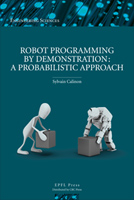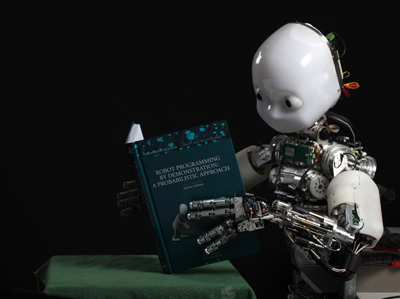Robot programming by demonstration: a probabilistic approach

Robot Programming by Demonstration (PbD) examines methods by which a robot learns new skills through human guidance. Also referred to as learning by imitation, tutelage or apprenticeship learning, PbD takes inspiration from the way humans learn new skills by imitation, thereby developing methods by which new skills can be transmitted to a robot. PbD covers a broad range of applications. In industrial settings, the goal is to reduce the time and costs required to program the robot, where the rationale is to create, modify or assemble a product in a very rapid way without requiring help from an expert in robotics. PbD is perceived as particularly useful when it comes to service robots, i.e., robots deemed to work in direct collaboration with humans. In this case, methods for PbD go beyond transferring skills and offer new ways for the robot to interact with the human, from being capable of recognizing people's motion to predicting their intentions and seconding them in the accomplishment of complex tasks. The present work addresses both challenges in investigating methods by which PbD is used to provide the robot with a generic and adaptive model of control.
"Robot programming by demonstration: A probabilistic approach" takes a practitioner's perspective and is relevant for anyone involved in robotics research or human-robot interaction, or who simply wants to discover and understand how to transfer skills to robots by imitation. The findings presented in this book emerge from various disciplines such as robot control, human-robot interaction, applied machine learning and artificial intelligence. It also takes insights from developmental and cognitive psychology.
The book contains a large set of didactic and illustrative examples linked with comprehensive and practical machine learning sourcecodes available online.
You can order the book online from EPFL Press, CRC Press or Amazon.
Sylvain Calinon, 2009 • 222 pages, hardcover • EPFL Press ISBN 978-2-940222-31-5, CRC Press ISBN 978-1-4398-0867-2.
